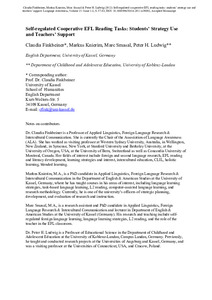| dc.date.accessioned | 2021-02-17T14:00:42Z | |
| dc.date.available | 2021-02-17T14:00:42Z | |
| dc.date.issued | 2012-04-11 | |
| dc.identifier | doi:10.17170/kobra-202102043121 | |
| dc.identifier.uri | http://hdl.handle.net/123456789/12523 | |
| dc.description | Project title: "Fostering the situationally adequate use of learning strategies in self-regulated, text-based learning environments in the English as a Foreign Language (EFL) classroom". Principal investigators: Prof. Dr. Claudia Finkbeiner, University of Kassel (Germany) and Prof. Dr. Peter H. Ludwig, University of Koblenz-Landau (Germany).
This is an Accepted Manuscript of an article published by Taylor & Francis in "langauge Awarenesss" on 11 April 2012, available online: https://www.tandfonline.com/doi/full/10.1080/09658416.2011.639892 | eng |
| dc.description.sponsorship | Funded by grants from the German Research Foundation (Deutsche Forschungsgemeinschaft – DFG; grant no. FI 684/13–1, FI 684/13–2 | ger |
| dc.language.iso | eng | eng |
| dc.rights | Namensnennung 4.0 International | * |
| dc.rights.uri | http://creativecommons.org/licenses/by/4.0/ | * |
| dc.subject.ddc | 420 | |
| dc.title | Self-regulated Cooperative EFL Reading Tasks: Students’ Strategy Use and Teachers’ Support | eng |
| dc.type | Aufsatz | |
| dcterms.abstract | The ADEQUA research project has gained empirical evidence on how the situationally adequate use of learning strategies can be facilitated during cooperative reading tasks in the EFL classroom. Two video studies were conducted with 9th grade EFL (English as a Foreign Language) learners in German schools: The first (laboratory) study investigated the students’ use of strategies while working in dyads and without teacher support on a given task. The second study, a field study, focused on teachers’ actions to support their students while working on a series of tasks in their regular classrooms. In this paper, we present the findings from a specific subsample of students (n = 30 from the first study and n = 228 from the second one), focusing on (a) the extent to which the students employed specific strategies adequately and successfully and (b) the types of support actions taken by the teachers and to what extent these actions facilitated the students’ strategy use. The microanalytic approach adopted here allows us to identify those strategies which especially appear to require a teacher’s support in order to be employed more adequately and successfully. Furthermore, by distinguishing between teachers’ support actions which are more vs. less conducive to self-regulation and facilitating students’ strategy use, we will provide recommendations on how to fine-tune teachers’ assistance. | eng |
| dcterms.accessRights | open access | |
| dcterms.creator | Finkbeiner, Claudia | |
| dcterms.creator | Knierim, Markus | |
| dcterms.creator | Smasal, Marc | |
| dcterms.creator | Ludwig, Peter H. | |
| dc.relation.doi | 10.1080/09658416.2011.639892 | |
| dc.relation.projectid | DFG Projektnummer: FI 684/13–1, DFG-Projektnummer: FI 684/13–2 | ger |
| dc.subject.swd | Fremdsprachenunterricht | ger |
| dc.subject.swd | Englisch | ger |
| dc.subject.swd | Lerntechnik | ger |
| dc.subject.swd | Sprachbewusstsein | ger |
| dc.type.version | acceptedVersion | |
| dcterms.source.identifier | EISSN 1747-7565 | |
| dcterms.source.issue | Issue 1-2 | |
| dcterms.source.journal | Language Awareness | eng |
| dcterms.source.pageinfo | 57-83 | |
| dcterms.source.volume | Volume 21 | |
| kup.iskup | false | |


